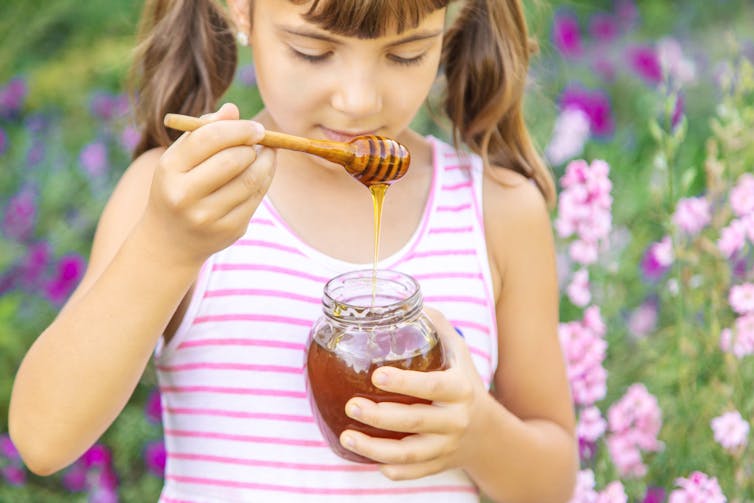Honey has a long history as a revered natural remedy across many cultures. Ancient civilisations recognised its therapeutic potential, employing it for various medicinal purposes. The ancient Egyptians, Assyrians, Chinese, Greeks and Romans, for instance, used it to heal wounds. And many cultures today continue to use it as a remedy for sore throats and coughs.
Some people also assert that honey can alleviate hay fever symptoms. Advocates of this method claim honey can help thanks to its purported anti-inflammatory and anti-allergic properties (though empirical evidence for this is lacking).
But what does science actually say about this age-old remedy? Recent investigations into honey’s potential for alleviating hay fever symptoms have yielded intriguing findings that certainly warrant further exploration.
One fascinating aspect being investigated is honey’s ability to act as a form of immunotherapy – a treatment strategy that aims to modify the immune system’s response to allergens.
Immunotherapy involves exposing the immune system to gradually increasing doses of allergens, such as pollen, in a controlled manner. This exposure helps desensitise the immune system over time, reducing its hypersensitivity and lessening allergic reactions.
Read more: Hay fever: how immunotherapy can help sufferers not getting relief from the usual treatments
For instance, one study found that people who consumed local honey daily for four weeks alongside an allergy tablet had significant improvements in their hay fever symptoms compared to those who only took an allergy tablet.
Honey’s anti-inflammatory properties are of considerable interest when it comes to hay fever. Honey contains various bioactive compounds, including flavonoids and phenolic acids, which exhibit anti-inflammatory effects. These compounds work by preventing inflammation in the body, which may help reduce many of the symptoms caused by an allergic reaction (such as a stuffy or runny nose).
Honey also boasts a rich array of antioxidants, such as polyphenols. These antioxidants scavenge harmful free radicals – unstable molecules that may damage cells and trigger inflammation. By neutralising free radicals, honey may help protect cells and tissues from damage, reducing allergic inflammation (and allergy symptoms).

Honey also has prebiotic characteristics, which may further explain their potential in managing hay fever symptoms. Prebiotics are substances that promote the growth and activity of beneficial gut bacteria, enhancing gut health. Emerging evidence suggests that honey’s prebiotic properties may change the composition and function of the gut microbiota.
Read more: Hay fever could be linked to our gut and nose bacteria – and probiotics may help symptoms
A healthy gut microbiota is essential for maintaining a balanced immune system and preventing aberrant immune responses – including allergic reactions. By promoting the growth of beneficial gut bacteria and bolstering gut function, honey may indirectly influence how severely we react to seasonal pollen.
What to consider
Not all honey is created equal. Where it’s sourced and how it’s processed may affect its therapeutic potential.
Raw honey, which undergoes minimal processing and retains more of its natural compounds, is often favoured for its potential health benefits.
Honey’s composition can also vary depending on the types of plants visited by the bees. Monofloral honey, derived primarily from the nectar of a single plant species, may contain specific compounds that offer therapeutic advantages over polyfloral varieties (derived from multiple plant species).
If you’re thinking about using honey to help with your hay fever symptoms, it’s important to take into account certain practical considerations and exercise caution.
Research recommends consuming 1g of honey per kilogram of body weight each day in order to have any affect. For a person weighing 80kg, this would translate to four tablespoons of honey daily. Studies also recommend taking honey before and throughout hay fever season in order to have the most benefit on symptoms.
It’s important to note that honey may not be suitable for everyone. Children under the age of one should not consume honey due to the risk of botulism, a rare but serious illness. People with severe hay fever or asthma should speak with their GP before using honey, as allergic reactions to bee products can be severe.
While honey shows promise in managing hay fever symptoms, it should complement, rather than replace, conventional therapies prescribed by your doctor since it may not work equally well for everyone. If you’re experiencing severe hay fever symptoms, it’s unlikely honey will provide sufficient relief.

